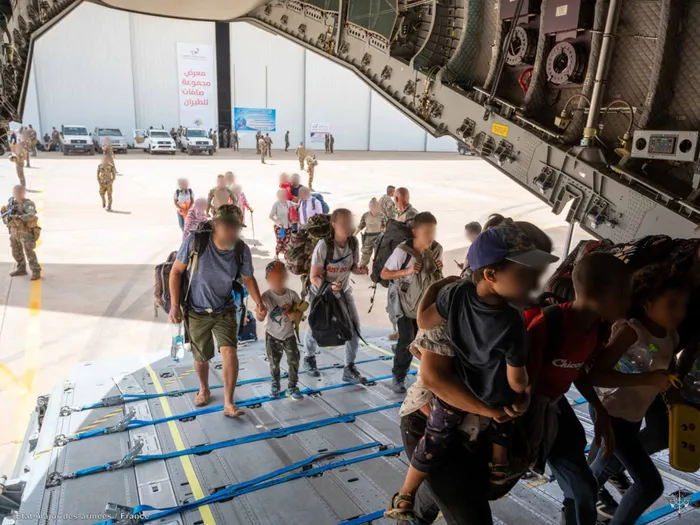Thousands flee Sudan as death toll rises

Picture: Laure-Anne Maucorps ep Derri / Etat Major des Armées / AFP / Taken on April 23, 2023 – French and other nationalities embark at French military air base in Khartoum to fly to Djibouti on April 23, during the "Sagittaire" evacuation of around 100 people from Sudan on the first French flight out of the war-hit country after a "complicated" rescue operation.
Picture: REUTERS – A man looks at belongings inside a damaged house during clashes between the paramilitary Rapid Support Forces and the army in Khartoum, Sudan April 17, 2023. According to the World Health Organisation, 3,700 people have been injured. The humanitarian crisis, including mass displacement, has continued to worsen as multiple ceasefires have failed to hold.
By Peoples Dispatch
Over 460 people have been killed as clashes between the Sudanese Armed Forces (SAF) and the paramilitary Rapid Support Forces (RSF) entered their ninth consecutive day on Sunday, April 23, the Health Ministry has said.
In a statement on Monday, April 24, morning, the Sudan Doctors Union (SDU) reported that various areas of the capital Khartoum were being bombarded, which had resulted in civilian deaths in the Kalakla area. It added that a hospital, already overcrowded with people with serious injuries, had also been hit with the number of people injured reaching 50.
Sudan Conflict | SA government assisting other nationals to evacuatehttps://t.co/Ra08jLKKbv
— eNCA (@eNCA) April 24, 2023
According to the World Health Organisation (WHO), 3,700 people have been injured since fighting broke out on April 15. Multiple ceasefire declarations have failed to hold, including a three-day truce that was confirmed by both the RSF and SAF on April 21 to mark the Muslim holiday of Eid al-Fitr. The United Nations Office for the Co-ordination of Humanitarian Affairs (UNOCHA) reported ongoing fighting over the weekend, including “unverified reports indicating clashes [had] intensified in Bahri and Omdurman on April 22”.
In a separate statement released earlier on Monday, the SDU had reported nine deaths — in Khartoum, Omdurman, Nyala, and Marawi — along with 36 injuries among civilians on Sunday.
It added that hospitals had been difficult to access due to lack of mobility given the security situation in the country. A widespread internet blackout was also reported by internet watchdog Netblocks, “with connectivity at 2 percent of ordinary levels” late on Sunday night.
As of Sunday, a total of 13 hospitals had been bombed and 19 had been forced to evacuate, the SDU said on Monday. Sixty-nine percent of hospitals adjoining the conflict zones are still out of service. These include 55 of the 79 basic hospitals in Khartoum and other States affected by the fighting.
Existing medical facilities are also on the brink of collapse due to a lack of medical personnel, medical supplies and electricity. The SDU added that six ambulances had also been attacked, while others were not allowed to pass through to transport patients or receive aid.
Tens of thousands of people have been forced to flee, with bulk of the displacement reported in the North, West, and South States of the Darfur region, the States of Khartoum, Blue Nile, North Kordofan, and the Northern State, according to preliminary findings released by the International Organisation for Migration’s (IOM) Displacement Tracking Matrix (DTM) on April 22.
People are fleeing not just due to the armed clashes, but also because of severe shortages of water and electricity — as observed in Khartoum’s Bahri locality. People are also fleeing to Egypt, South Sudan, and Chad, according to the DTM report.

Meanwhile, foreign countries including the US, UK, France, Germany, Russia, Italy, Spain, Jordan, and Canada have accelerated the evacuation of their citizens and diplomats. Turkey initiated evacuation efforts via road from the southern city of Wad Madani on Sunday. Egypt has evacuated its citizens through land ports. UN convoys have also transported foreign citizens to Port Sudan for evacuation.
While the US has temporarily closed its embassy in Sudan, it has announced that its forces “will remain deployed in Djibouti to protect US personnel and others until the security situation no longer requires their presence”.
Other countries including India, Libya, Tunisia, Japan, Sweden, Ireland, Ghana, and Kenya are also co-ordinating evacuation efforts. Nigeria has requested safe passage for 5,500 of its citizens, which includes students.

In a statement on April 22, the SDU warned that the ongoing evacuation efforts were an indication of not only the failure of the demand for a ceasefire, but pointed to the expectation that the conflict in Sudan will continue and “spread in residential neighbourhoods” across large parts of the country. This has resulted in concerns — especially from foreign countries — of an increase in violence and casualties.
SDU also said that evacuations would put Sudan’s own defenceless citizens in greater danger, “as experience has shown that the parties to the conflict [the RSF and the SAF] are keen on [saving] the lives of foreign nationals only, without any regard for the lives of peaceful Sudanese citizens”.
Amid calls by the US and the European Union for talks and a political settlement, Sudan’s revolutionary forces have reiterated the need for an urgent ceasefire, while also steadfastly emphasising that any meaningful solution to the crisis in the country must emerge from the demands of the years-long mass movement which had declared “No Negotiations, No Compromise, No Partnership” with the military.
This article was first published on Peoples Dispatch